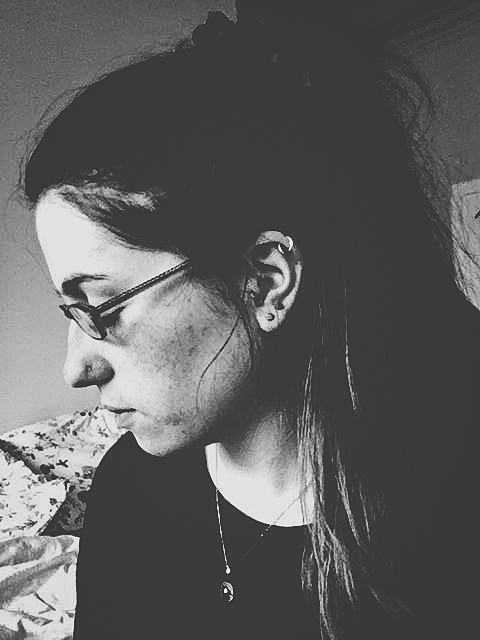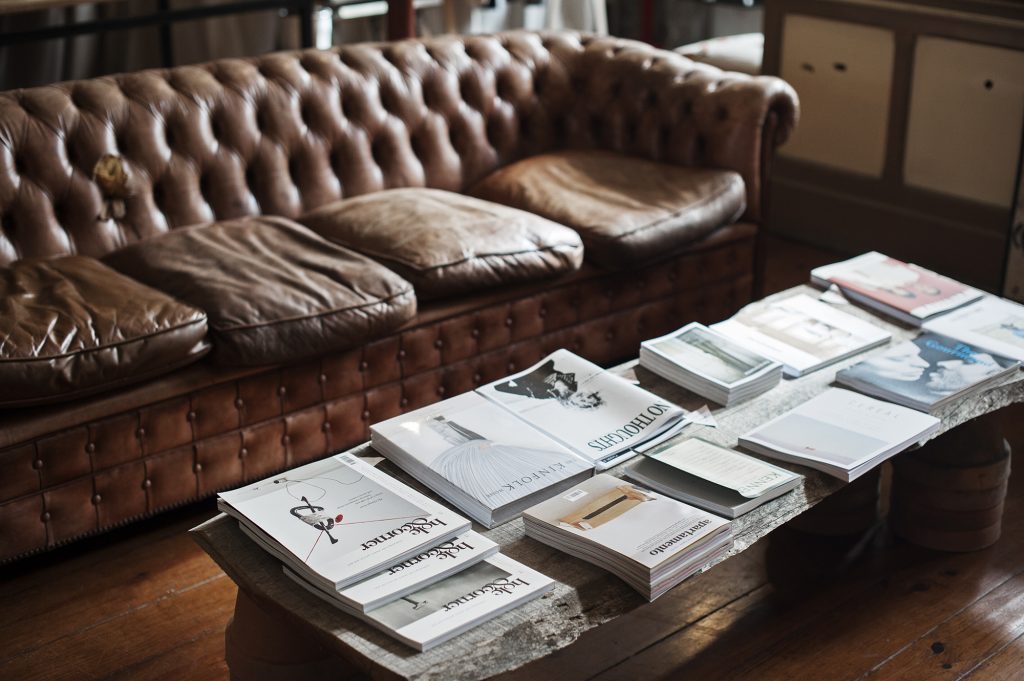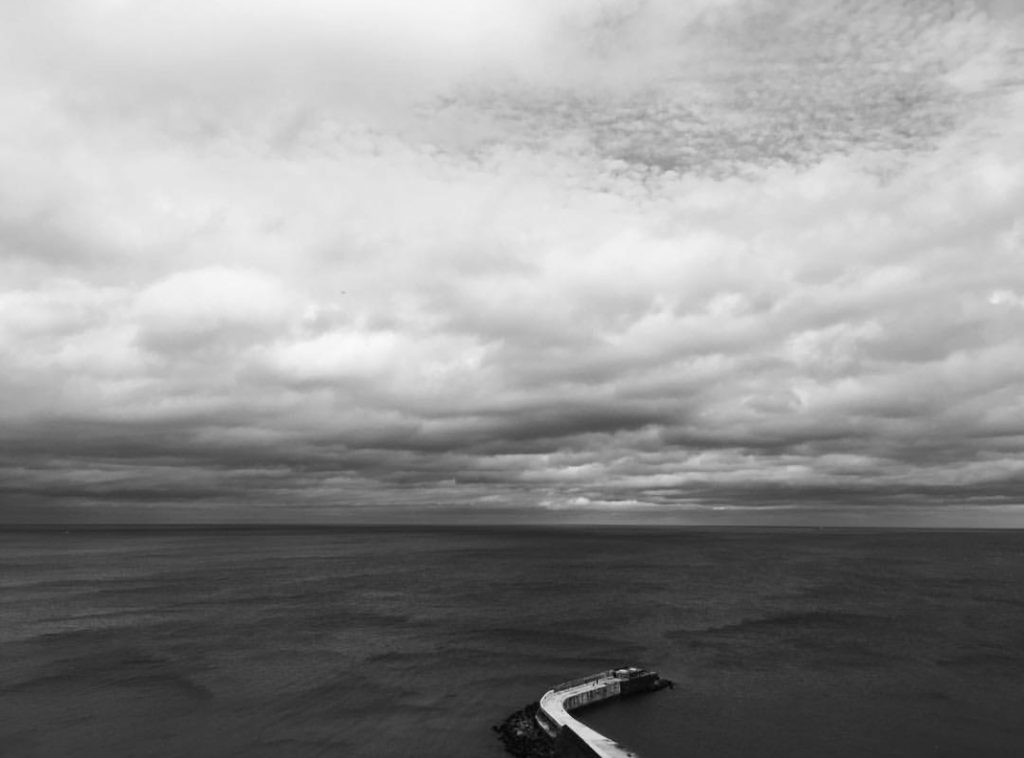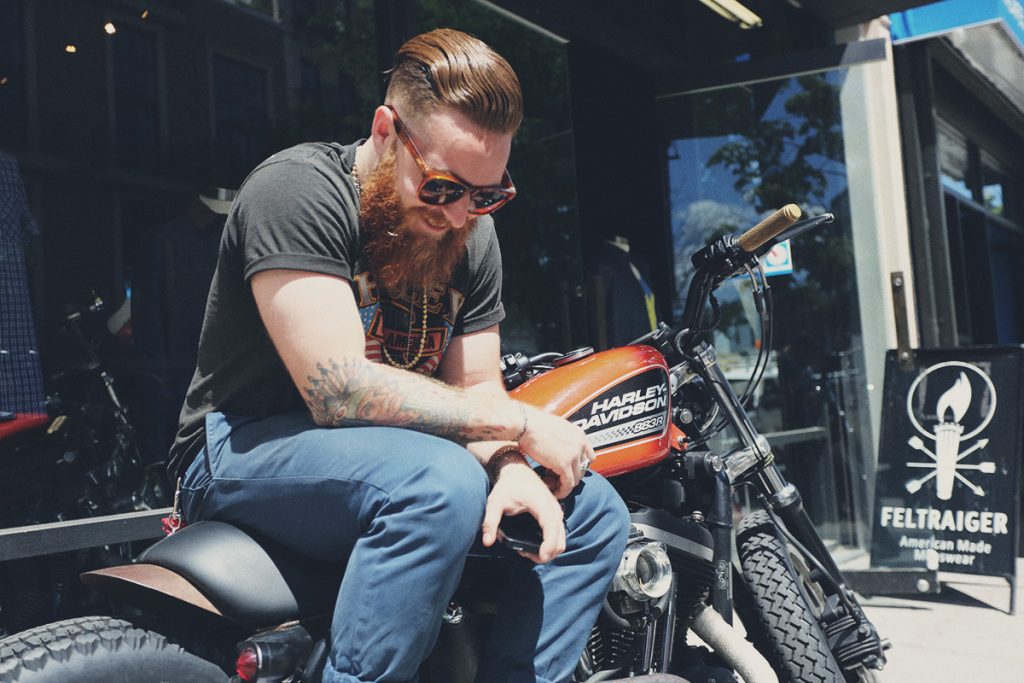Her work is so astonishingly relatable that you can’t help but think: ‘surely this girl has some way of seeing all the stuff going on in my head, because she’s just gone and bloody well drawn it!’ Much of RubyEtc’s work makes complex, often dark issues infinitely more approachable. She uses Tumblr as a platform to present her work to the world, and her pencil and watercolour action is leaving an impressive and positive imprint on the blogosphere.
Did you umm and ahh before setting up your Tumblr account? Was it an ‘I just want to share photos of cats’ sort of choice, or did you want an open space for your art?
It was definitely done out of curiosity, and I was encouraged by my friend who had been using the site for a couple of years. At the time I was using BlogSpot to write about my experiences as a young adult in the mental health system, and it wasn’t until a couple of months in when I bought a scanner that I started using it to share drawings.
You’re making difficult, often dark, subjects much more approachable with art that is uncomplicated, sassy and often very funny. How important is it, do you think, for mental health to be explained and explored using the kind of approach that you use?
I think in the age of blogging and online publication, there is a lot of space for people to come together and shed light on what are often very isolating, shame-ridden illnesses. One of the amazing things I have discovered through sharing my art is that people across the spectrum of wellness seem to be able to relate to it. I’d like to think this presents a subtle, but important challenge to the alienation people often suffer when they are diagnosed or suffering from a mental illness. That is to say that the feelings and experiences someone who is unwell might have are often accentuated and heightened versions of what humans have to deal with as a whole. This doesn’t undermine how serious and debilitating mental illness can be, but helps put it in a more normal context. I think it’s important that people feel able to talk about themselves and their experiences as people, with the illness forming an important, but not exclusive aspect of who they are.
Have you always thought of creativity as being a healthy tool to manage mental illness? When did you discover that healing and personal strength can lie in being creative?
I had always found relative solace in writing diaries, particularly during my early teenage years when I first became unwell. I don’t think it was until 2011 when I was in the depths of a major depressive episode, out of education and at a completely loose end that I picked up a pen again for the first time and began to draw. There was no art teacher and no deadlines, I just started making these funny, very angry little drawings of myself sitting in therapy or lying on the sofa crying. It was cathartic! I think I’d read Allie Brosh’s fantastic Hyperbole and a Half blog and thought, ‘bloody hell, I could make stuff like this’. From then on I found drawing was something I could fully immerse myself in. It held my concentration like nothing else and I got a real sense of satisfaction from creating something that expressed just how extreme I was feeling.
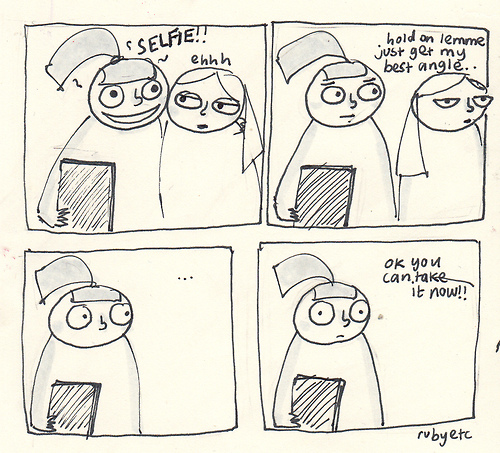
Your online community has some real muscle, would you say that you gain mental and emotional strength from your followers and the people who contact you through Tumblr and Facebook
I do feel incredibly lucky to have such a strong online following. I can go through periods of total detachment where I feel intellectually bolstered by the steady trickle of support, but can’t quite fathom it emotionally. Other times I feel really connected to those around me and it can be overwhelming to see the solidarity between me and all the fantastic people I’ve shared art with. It does keep me going, and it’s given me a huge context to exist in outside of my illness which I really didn’t have a few years ago.
How does it makes you feel to see people going totally crazy for your work?
It is bizarre! When I reply to a message and someone says ‘oh my god, I am fangirling so hard right now’, I think: ‘blimey, I am literally just sitting in my pyjamas at my desk all day drawing silly cartoons – how can that be special?’ But no, it can feel really very good and incredibly rewarding when most of what I make lives very close to my heart.
London has always been your home, what is it about the concrete metropolis that inspires you?
I love London. I love it for its anonymity and pace. I am a chronic people watcher, and I love sitting on a bus just catching snippets of conversations or watching everyone walk by from my park bench vantage point. Whenever I am staying somewhere more rural the silence freaks me out for ages! My ears don’t know what to do when there’s not a load of traffic and dogs barking and people yacking on mobiles. There is a lot of noise and a lot of colour; it’s a claustrophobic’s nightmare, but feels very safe to me.
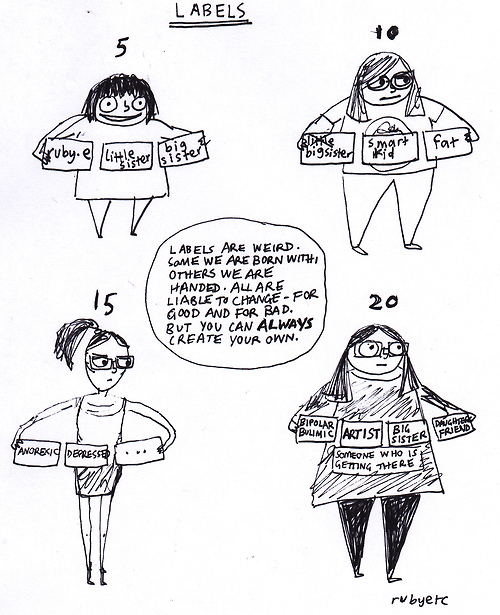
You approach complex subject matter with surprising ease, though still maintain an element of privacy about your own experiences. How important is it to you to keep some things quiet and out of the public eye?
This is definitely something that’s shifted for me as my audience has grown. At the beginning I would share very personal events much more readily, but I am hugely aware now that once you put something up online it can never be truly deleted. I can at times be very vulnerable, and I know sharing explicit details about self-harm and hospitalisation for example, could lead to unwanted attention. I’m fairly sure there’ll come a time when I’ll be able to write and draw about all these things as part of a more cohesive and expanded work, but right now it doesn’t feel particularly prudent to divulge it in real time.
Would you consider yourself a stationery freak or do you just grab whatever pen you happen to find under the sofa cushion?
My sofa cushions actually came fused to the sofa so it’d be a bit difficult to lodge pens under them! Partially because I’m a huge amateur, and partially because I don’t like to feel limited, I will happily use any sort of pen I can find. That being said, I buy a lot of stationery and have forked out on some more upmarket markers because they give such nice tone and feel great to use. It’s easy to see which pens I used the most, you can just look at the lids and see which are the most contorted and covered in bite marks.
How does it make you feel knowing you’re reaching out to so many people whenever you publish a post?
This month I actually hit over 54,000 Tumblr followers! I’m fairly chilled out when I post things. I think if I started trying to construct uber-meaningful, uber-perfected things for every single post it would kind of defeat the purpose. I think now I’ve set the precedent for my drawings being pretty scrappy and immediate most of the time, people seem to go along with it. But it does feel incredible to get such a consistent response!
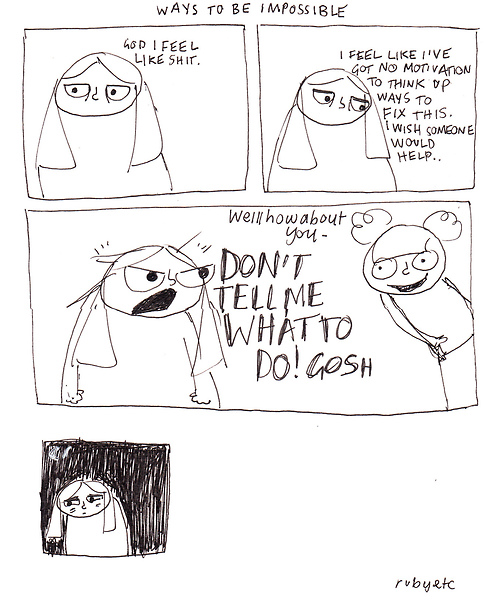
Would you say Tumblr is an effective platform for spreading the word about mental health?
Yes, for the most part. I know it’s got a fair amount of bad press for all the harmful imagery and blogging associated with ‘pro-eating disorders’ and ‘pro-self-harm’ movements. That definitely exists, and there is a certain amount of glamorisation that goes on, particularly when it comes to these two topics. However, there is also a large section of the site where people are incredibly receptive and assertive about the exposure and awareness of all kinds of really important social issues – including mental health. There is a lot of acceptance to be found there, although it can end up a bit like a lot of people shouting at each other who already agree about the thing they are shouting about.
I’ve seen some lovely and some offensive comments on your Tumblr. Do you publish all the comments you get?
Ooh no, I mean as much as I want to acknowledge the lovely anonymous messages I receive it makes me feel a bit self-important to post them so I tend to just answer ones where I have a response that might entertain, or when I feel it’s important for me to stand my ground. Luckily the trolling seems to be very isolated.
You have a Society 6 page where people can buy items which display your work. How does your heart react when you see your artwork printed on shower curtains and laptop cases?
It’s such a giddy feeling, absolutely! The first time someone sent me a picture wearing one of my t-shirts it felt so awesome. It’s kind of surreal to think people thousands of miles away are carrying around or wearing little bits of me and my art.
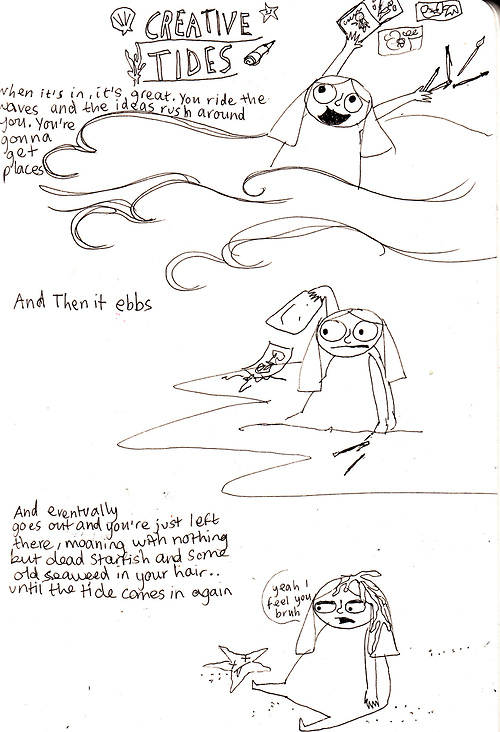
I noticed recently that someone had a tattoo done of one of your pieces. How did you react?
Of course I was thrilled; it’s such a compliment for someone to want to wear my design for the rest of their life. I’ll admit it felt a little surreal at first, it was never a direction I thought I could branch out into and it came out of nowhere! I’ve now had about five people get my curly cat tattooed and have taken up a couple of commissions for original designs so that’s fab.
For a twenty year old you’ve achieved a great deal. Do you ever sit back and say to yourself ‘Ruby, you’re doing alright?’
As someone who is deeply self-critical I will almost always find a way to undermine any objective achievements. But art has allowed me – very quietly – to start nurturing some confidence and I do have small moments of self-acknowledgement. I hope to continue to grow as an artist and person so that at some point I am able to say those words and really mean them.
